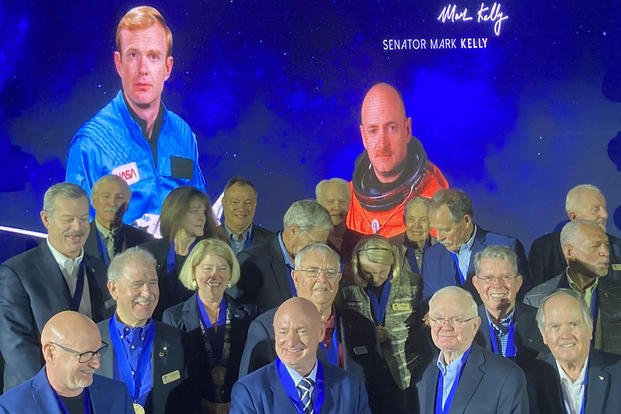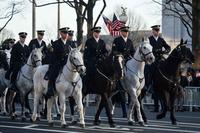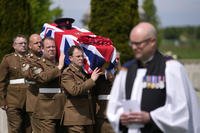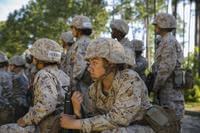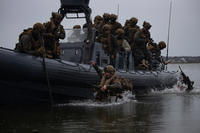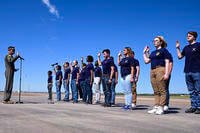KENNEDY SPACE CENTER -- Sen. Mark Kelly retired from NASA before his twin brother Scott, but it took him three years longer to be inducted into the U.S. Astronaut Hall of Fame.
"Scott, you beat me to this one, but as special as it is, or was, to be an astronaut, nothing compares to doing it with your clone," Mark said Saturday during a ceremony for him and fellow astronaut, retired Air Force Maj. Gen. Roy Bridges, under Space Shuttle Atlantis at Kennedy Space Center Visitor Complex.
Bridges, a member of the second class of space shuttle astronauts chosen in 1980, flew on one space shuttle mission, STS 51-F, in 1985 aboard Space Shuttle Challenger, but also later served as the director at both NASA's Kennedy Space Center and Langley Research Center.
Kelly, also a retired captain in the Navy, flew on four space shuttle missions, twice as pilot and twice as commander. His first flight was on Space Shuttle Endeavour on STS-108 in 2001, the first shuttle mission after 9/11. He then flew again as pilot on STS-121 in 2006 on board Space Shuttle Discovery, the first mission after the Space Shuttle Columbia disaster three years earlier. He flew on Discovery again as commander on STS-124 in 2008 and then commanded the last flight of Endeavour on STS-134 in 2011.
The two men became the 106th and 107th inductees to the hall of fame that was created in 1990 by the Astronaut Scholarship Foundation and is represented at the visitor complex with its own building honoring the inductees, several of whom were at Saturday's ceremony.
They included Mark's twin brother and several others of their astronaut class of 1996, known as the Sardines.
"The list of human beings who have made a greater contribution to space exploration than my brother Scott is very, very short and it means very much to me to be joining these ranks with you," he said.
Kelly also paid homage to his parents, both police officers.
"I'm grateful to be born in a country where the sons of two police officers who watched the Apollo missions from their living room floor would go on to reach the heights of the world's greatest space program," he said. "They had no idea that they were raising two astronauts, but they raised us to value public service."
Also on hand was current NASA Administrator Bill Nelson, one of five U.S. senators that also can call themselves astronauts.
Nelson, who flew to space when he was in the U.S. House of Representatives in 1986, was the friendly target of Kelly after earlier references were made about how Kelly could as a member of the Senate help out with NASA's budget appropriations request.
"Maybe later Sen. Nelson and I could have another discussion about members of Congress going into space. Bill? Bill, I gotta say, I'm all for this. Fantastic idea," Kelly said.
Nelson spoke ahead of the introductions of Kelly and Bridges.
"105 adventurers, explorers and pioneers have been bestowed with this honor, and today we welcome two more," Nelson said. "Every astronaut has their own story. What links Roy and Mark is that they not only pushed the limits of humanity's reach, but both showed their humanity continuing to serve at NASA and our nation beyond their days as astronauts -- as center director and as a U.S. senator. Both have that daring spirit but also the spirit of a servant leader's heart."
Nelson was the first of many on the day also to make solemn reference to Mark's wife who was in attendance, former U.S. Rep. Gabby Giffords, who just months before Kelly's final flight was a victim in a mass shooting.
"She summoned the strength to watch her husband ascend upward for the final time," Nelson said. "Her courage and strength continue to be an inspiration for all of us. And Mark showed us what it is to be a husband."
Kelly, who retired from NASA and the Navy after that flight to help take care of his wife, thanked her during his speech.
"To my wife Gabby, thanks for the years of putting up with the commuter marriage, sometimes to space, so that we could both serve our country the best ways we knew how at the time," he said. "You've faced such a difficult road back to recovery. I mean I agonized. I agonized over the decision of whether to move forward and fly my last space shuttle flight, STS-134, but then as always you were the best friend and partner that I could ever ask for."
Kelly was also somber when remembering those lost during Columbia's disaster, which included three of his astronaut classmates.
"There probably isn't a day at NASA I remember more vividly than Feb. 1, 2003, when Columbia disintegrated on reentry," he said, noting that he and others flew to the crash sites in Texas and Louisiana "retrieving the remains of our STS-107 colleagues. It was personal in ways most can't imagine. It was hard. ... These explorers paid the ultimate sacrifice and I think of them so very often."
He said he was proud to be among those inducted into the hall, but put that achievement into perspective.
"The reality is that anyone who crams themselves into a pressure suit, puts on a helmet, and some boots from Walmart, and then climbs onto the top of a rocket for the country is worthy of the same recognition," he said. "It is a difficult and dangerous job, and it's those risks that create the opportunity to do the extraordinary things that each and every one of us signed up for."
©2023 Orlando Sentinel.
Visit orlandosentinel.com.
Distributed by Tribune Content Agency, LLC.

